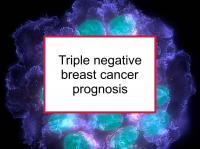The incidence of triple negative breast cancer compared to other types of breast cancer has been estimated to be approximately 24% to 28% among African American women and 20% among Latinas compared to 12% for non-Hispanic white patients as of 2016. Black and Latina women tend to develop the disease at a younger age than white women.
One study found that the median age at diagnosis of Hispanic women with breast cancer in Mexico City was 11 years younger than the average age reported in the general population in the U.S. Another study of Latinas found that 35% of the triple negative patients with recurrences had been found to be lymph node negative after mastectomy. This suggests that lymph node status, one of the most frequently used indicators of prognosis, might not be as useful a marker in this population.
Evidence suggests that there are racial differences in survival for triple negative disease, however not all studies agree on this point. African Americans are more likely to experience disease progression while undergoing chemotherapy (indicating that the disease is not responding to the treatment). One study found that mortality was higher for African American compared to non-African American women in North Carolina with triple negative breast cancer. However, the same study found that mortality was slightly lower among premenopausal, African American women compared to premenopausal non-African American women.
Receiving timely treatment is especially important for triple negative breast cancer patients. One 2015 study reported that a delay of more than 90 days in starting adjuvant chemotherapy (after surgery to remove the tumor) was associated with a 53% higher risk of breast cancer-specific death compared to treatment that was started within 30 days. The same study reported that delays were more likely for African American and Latina women, those with low socioeconomic status, and those who did not have private health insurance.
The bottom line is that triple negative disease in African American and Latina women should be considered very aggressive and treated accordingly. Patients should attempt to avoid any unnecessary delays in treatment and often could benefit from chemotherapy.
Below under Selected breast cancer studies are links to studies concerning the prognosis of African Americans and Latinas with triple negative breast cancer.
Additional triple negative breast cancer articles
Below are links to some other articles concerning triple negative breast cancer.
